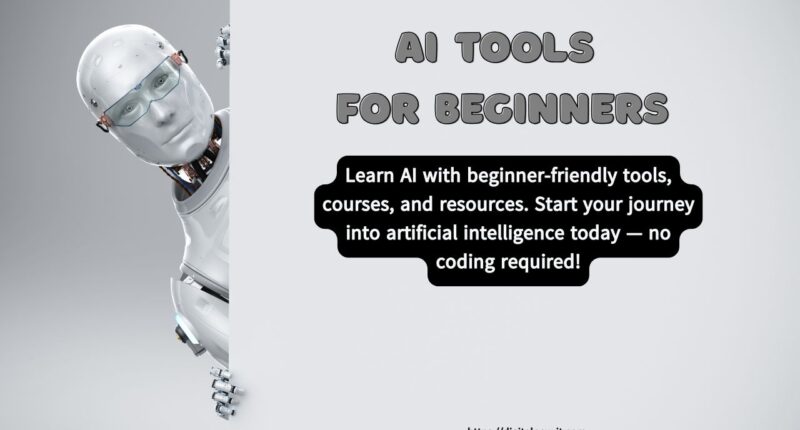Getting Started with AI: Beginner-Friendly Tools, Courses & Resources You Need to Know
Artificial Intelligence (AI) is rapidly transforming the world we live in, from automating repetitive tasks to enabling smarter decision-making in businesses. But for beginners, getting started in AI can seem overwhelming. Fortunately, there are plenty of beginner-friendly tools and resources available to help you learn the basics and start building your own AI projects.
In this guide, we’ll explore the most accessible tools, free platforms, and practical resources that make learning AI easier than ever.
What is Artificial Intelligence?
Artificial Intelligence refers to the simulation of human intelligence in machines. These systems can perform tasks that typically require human intelligence, such as visual perception, speech recognition, decision-making, and language translation.
AI is often divided into subfields like:
-
Machine Learning (ML) – Systems that learn from data.
-
Natural Language Processing (NLP) – Understanding and generating human language.
-
Computer Vision – Recognizing images and objects.
-
Robotics – Machines that can perform human-like actions.
Whether you want to become a data scientist, build smart apps, or just understand the tech behind it, there’s a path for every interest.
Why Beginners Should Learn AI
Learning AI opens the door to many career opportunities in tech, healthcare, finance, education, and more. But beyond job prospects, it also enhances your problem-solving skills and helps you stay ahead in an increasingly automated world.
Even if you don’t have a technical background, there are tools designed to make AI approachable for everyone.
Top AI Tools for Beginners
1. Google Teachable Machine
A browser-based tool by Google, Teachable Machine lets you train a simple AI model using images, audio, or poses—without any coding skills.
-
Use case: Great for teachers, students, and hobbyists.
2. Microsoft Lobe
Lobe is a free app that lets you build machine learning models with a simple drag-and-drop interface. You can train it to recognize images and connect it to apps or devices.
-
Use case: Beginners interested in computer vision.
-
Link: https://www.lobe.ai
3. IBM Watson Studio
Watson Studio provides a collaborative environment for data scientists, developers, and analysts to build and train AI models.
-
Use case: More advanced beginners ready to explore real-world datasets.
4. ChatGPT
OpenAI’s ChatGPT is a powerful language model you can use to understand AI concepts, ask coding questions, or even generate code.
-
Use case: Learning and brainstorming AI-related projects.
-
Link: https://chat.openai.com
Best Online Platforms to Learn AI
1. Coursera
Coursera offers beginner-friendly AI courses from top universities like Stanford and institutions like DeepLearning.AI.
-
Recommended course: “AI for Everyone” by Andrew Ng
2. edX
edX is another platform providing high-quality AI and machine learning courses from MIT, Harvard, and more.
-
Recommended course: “Artificial Intelligence (AI)” by Columbia University
3. Kaggle
Kaggle is a data science platform with free datasets, coding notebooks, and tutorials. It’s an excellent place to practice your AI skills and join competitions.
-
Use case: Hands-on learning through real data.
4. Fast.ai
Fast.ai provides a free deep learning course designed to make AI more accessible. It focuses on practical applications over theory.
-
Use case: Great for beginners who want to build real projects quickly.
AI Communities and Forums
Connecting with other learners is crucial for growth. Here are a few online communities where you can ask questions, share projects, and get feedback:
-
Reddit: Try subreddits like r/MachineLearning or r/LearnMachineLearning.
-
Stack Overflow: A valuable resource for coding and technical AI questions.
-
AI Discord Servers: Many AI learning communities have active Discord channels for real-time collaboration.
Tips to Get Started with AI
-
Start small: Begin with basic tutorials and simple models.
-
Practice consistently: Like any skill, consistency is key in learning AI.
-
Build real projects: Apply what you learn in small projects like chatbots or image classifiers.
-
Don’t fear math: While some math is needed, many tools simplify complex calculations.
-
Stay updated: Follow AI news blogs, podcasts, and newsletters to keep up with the latest trends.
Conclusion
Getting started with AI doesn’t have to be difficult. With beginner-friendly tools like Teachable Machine, online courses from platforms like Coursera, and supportive communities, anyone can learn AI and begin building their own smart applications. Whether you’re a student, a professional looking to upskill, or just curious about the future of technology, there’s never been a better time to dive into artificial intelligence.
To explore more digital tools and resources for beginners, visit:
👉 https://digitalnew.it.com









